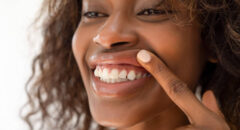 Using dentures, either partial or full, can support an active lifestyle and boost your confidence, no matter your age. Here are a few ways to keep that smile shining bright with dentures.
Using dentures, either partial or full, can support an active lifestyle and boost your confidence, no matter your age. Here are a few ways to keep that smile shining bright with dentures.
Give your dentures a break. At a minimum, the American Dental Association (ADA) recommends you take your partials and dentures out of your mouth for at least four hours daily. The ADA says it’s best to remove your dentures and partials at night to allow your gums to rest as you sleep. However, it is not always necessary to remove your dentures before going to bed. Check with your dentist on how long you should wear your dentures each day. If you take them out, keep them moist in water or better yet in a denture-cleansing solution. Never place dentures in hot water, which could cause warping, states the ADA.
Look after your whole mouth. Even if you have dentures, you still must practice good oral hygiene. Before inserting your dentures, the ADA recommends brushing your gums, tongue and roof of your mouth with a soft-bristled toothbrush. This stimulates circulation in the tissues of your mouth and of course, helps remove plaque.
Adhesives. Here’s the thing about dentures: they’re fitted just right for your mouth. Dentures that are loose or slip can be a cause of gum soreness or mouth sores, states the ADA. Try using an adhesive, like Super Poligrip®, to help them stay in place.
If it doesn't fit, you must re-check it. If your dentures aren’t fitting properly or you aren’t producing enough saliva to hold them in place, these are definitely reasons to check in with your dentist. The ADA explains that dentures that are ill-fitting may need to be relined or replaced.
Don't let your dentures dry out. If dentures become dry, they can warp. When not wearing your dentures, the ADA recommends storing them in a container with enough water (or denture cleanser solution) to cover the dentures. This also helps dentures retain their shape.
Use a very soft toothbrush. Just like teeth, dentures should be brushed daily to remove food particles, prevent staining and for overall oral health. Hard-bristled toothbrushes may be abrasive and scratch dentures, so the ADA recommends using a soft toothbrush and non-abrasive cleaners made specifically for cleaning dentures.
Handle with care. Damaged dentures should not be worn. To avoid accidentally dropping your dentures on a hard surface, which may cause them to break, an easy tip from MyDentureCare.com is to stand over a towel or a sink filled with water while handling them.
Schedule regular dental checkups. Many people forget this important tip from the ADA. Your dentist will advise you about how often to visit to have your dentures examined. Your dentist can help ensure a proper fit to prevent slippage and discomfort. Your dentist can also check the inside of your mouth to make sure it's healthy.









